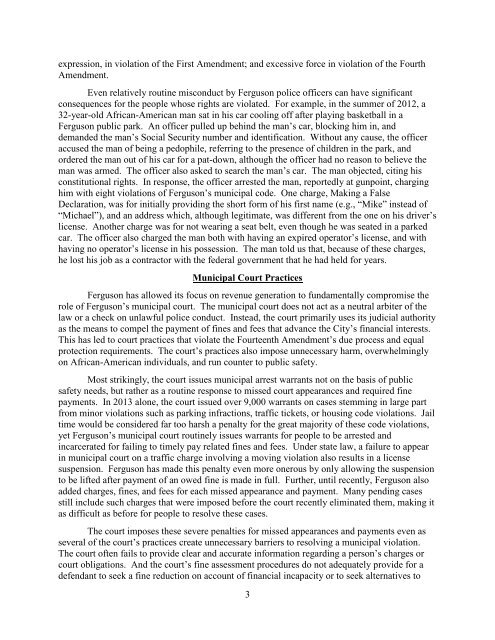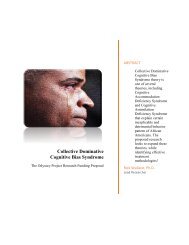U.S. Justice Department Report on the Ferguson Police Department
Ferguson’s law enforcement practices are shaped by the City’s focus on revenue rather than by public safety needs. This emphasis on revenue has compromised the institutional character of Ferguson’s police department, contributing to a pattern of unconstitutional policing, and has also shaped its municipal court, leading to procedures that raise due process concerns and inflict unnecessary harm on members of the Ferguson community.
Ferguson’s law enforcement practices are shaped by the City’s focus on revenue rather than by public safety needs. This emphasis on revenue has compromised the institutional character of Ferguson’s police department, contributing to a pattern of unconstitutional policing, and has also shaped its municipal court, leading to procedures that raise due process concerns and inflict unnecessary harm on members of the Ferguson community.
Create successful ePaper yourself
Turn your PDF publications into a flip-book with our unique Google optimized e-Paper software.
expressi<strong>on</strong>, in violati<strong>on</strong> of <strong>the</strong> First Amendment; and excessive force in violati<strong>on</strong> of <strong>the</strong> Fourth<br />
Amendment.<br />
Even relatively routine misc<strong>on</strong>duct by Fergus<strong>on</strong> police officers can have significant<br />
c<strong>on</strong>sequences for <strong>the</strong> people whose rights are violated. For example, in <strong>the</strong> summer of 2012, a<br />
32-year-old African-American man sat in his car cooling off after playing basketball in a<br />
Fergus<strong>on</strong> public park. An officer pulled up behind <strong>the</strong> man’s car, blocking him in, and<br />
demanded <strong>the</strong> man’s Social Security number and identificati<strong>on</strong>. Without any cause, <strong>the</strong> officer<br />
accused <strong>the</strong> man of being a pedophile, referring to <strong>the</strong> presence of children in <strong>the</strong> park, and<br />
ordered <strong>the</strong> man out of his car for a pat-down, although <strong>the</strong> officer had no reas<strong>on</strong> to believe <strong>the</strong><br />
man was armed. The officer also asked to search <strong>the</strong> man’s car. The man objected, citing his<br />
c<strong>on</strong>stituti<strong>on</strong>al rights. In resp<strong>on</strong>se, <strong>the</strong> officer arrested <strong>the</strong> man, reportedly at gunpoint, charging<br />
him with eight violati<strong>on</strong>s of Fergus<strong>on</strong>’s municipal code. One charge, Making a False<br />
Declarati<strong>on</strong>, was for initially providing <strong>the</strong> short form of his first name (e.g., “Mike” instead of<br />
“Michael”), and an address which, although legitimate, was different from <strong>the</strong> <strong>on</strong>e <strong>on</strong> his driver’s<br />
license. Ano<strong>the</strong>r charge was for not wearing a seat belt, even though he was seated in a parked<br />
car. The officer also charged <strong>the</strong> man both with having an expired operator’s license, and with<br />
having no operator’s license in his possessi<strong>on</strong>. The man told us that, because of <strong>the</strong>se charges,<br />
he lost his job as a c<strong>on</strong>tractor with <strong>the</strong> federal government that he had held for years.<br />
Municipal Court Practices<br />
Fergus<strong>on</strong> has allowed its focus <strong>on</strong> revenue generati<strong>on</strong> to fundamentally compromise <strong>the</strong><br />
role of Fergus<strong>on</strong>’s municipal court. The municipal court does not act as a neutral arbiter of <strong>the</strong><br />
law or a check <strong>on</strong> unlawful police c<strong>on</strong>duct. Instead, <strong>the</strong> court primarily uses its judicial authority<br />
as <strong>the</strong> means to compel <strong>the</strong> payment of fines and fees that advance <strong>the</strong> City’s financial interests.<br />
This has led to court practices that violate <strong>the</strong> Fourteenth Amendment’s due process and equal<br />
protecti<strong>on</strong> requirements. The court’s practices also impose unnecessary harm, overwhelmingly<br />
<strong>on</strong> African-American individuals, and run counter to public safety.<br />
Most strikingly, <strong>the</strong> court issues municipal arrest warrants not <strong>on</strong> <strong>the</strong> basis of public<br />
safety needs, but ra<strong>the</strong>r as a routine resp<strong>on</strong>se to missed court appearances and required fine<br />
payments. In 2013 al<strong>on</strong>e, <strong>the</strong> court issued over 9,000 warrants <strong>on</strong> cases stemming in large part<br />
from minor violati<strong>on</strong>s such as parking infracti<strong>on</strong>s, traffic tickets, or housing code violati<strong>on</strong>s. Jail<br />
time would be c<strong>on</strong>sidered far too harsh a penalty for <strong>the</strong> great majority of <strong>the</strong>se code violati<strong>on</strong>s,<br />
yet Fergus<strong>on</strong>’s municipal court routinely issues warrants for people to be arrested and<br />
incarcerated for failing to timely pay related fines and fees. Under state law, a failure to appear<br />
in municipal court <strong>on</strong> a traffic charge involving a moving violati<strong>on</strong> also results in a license<br />
suspensi<strong>on</strong>. Fergus<strong>on</strong> has made this penalty even more <strong>on</strong>erous by <strong>on</strong>ly allowing <strong>the</strong> suspensi<strong>on</strong><br />
to be lifted after payment of an owed fine is made in full. Fur<strong>the</strong>r, until recently, Fergus<strong>on</strong> also<br />
added charges, fines, and fees for each missed appearance and payment. Many pending cases<br />
still include such charges that were imposed before <strong>the</strong> court recently eliminated <strong>the</strong>m, making it<br />
as difficult as before for people to resolve <strong>the</strong>se cases.<br />
The court imposes <strong>the</strong>se severe penalties for missed appearances and payments even as<br />
several of <strong>the</strong> court’s practices create unnecessary barriers to resolving a municipal violati<strong>on</strong>.<br />
The court often fails to provide clear and accurate informati<strong>on</strong> regarding a pers<strong>on</strong>’s charges or<br />
court obligati<strong>on</strong>s. And <strong>the</strong> court’s fine assessment procedures do not adequately provide for a<br />
defendant to seek a fine reducti<strong>on</strong> <strong>on</strong> account of financial incapacity or to seek alternatives to<br />
3

















